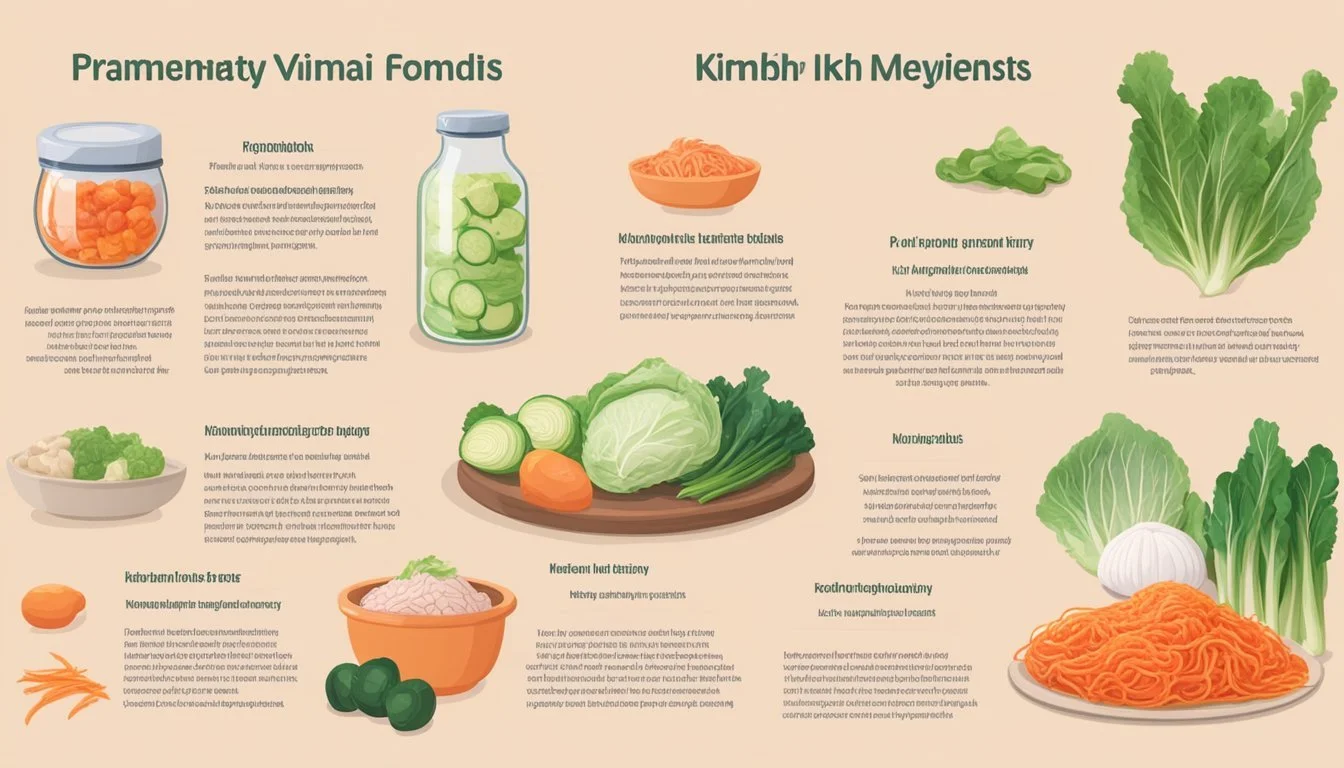Can Pregnant Women Eat Kimchi?
Safety and Health Insights
Kimchi, a traditional Korean fermented food, is known for its distinct taste and nutritional benefits. During pregnancy, maintaining a healthy diet is crucial for the well-being of both mother and child. Pregnant women often question whether it is safe to continue consuming foods like kimchi, which are high in vitamins and probiotics but also possess strong flavors and are a product of fermentation.
Eating kimchi while pregnant can be beneficial due to its high content of essential nutrients such as vitamins A, B, and C, as well as minerals like iron and calcium. These nutrients support both maternal health and fetal development. However, it is important for pregnant women to consider the preparation and pasteurization of kimchi. Pasteurized kimchi is generally considered safe as the process eliminates harmful bacteria, while unpasteurized kimchi could pose a risk of exposure to pathogens like E. coli or Salmonella.
When incorporating kimchi into a pregnancy diet, moderation and food safety should guide a woman's choices. Ensuring that the kimchi is not spoiled and is prepared in sanitary conditions can allow pregnant women to enjoy its flavors and health benefits without unnecessary risk. Pregnant women should consult with their healthcare provider before making any significant dietary changes, including the addition of kimchi to their diet.
Benefits of Kimchi During Pregnancy
Kimchi, as a fermented food, offers a wealth of health benefits that can be particularly advantageous during pregnancy. It is not only a rich source of essential nutrients but also enhances digestive and gut health through its probiotic properties.
Nutritional Value
Kimchi is a nutrient-dense side dish, providing an array of vitamins and minerals critical for pregnancy. It is especially high in vitamins A, B6, and C, which support the immune system and fetal development. The iron content in kimchi contributes to preventing anemia, a common condition in pregnant women. Additionally, it supplies plant-based calcium and selenium, along with being a good source of folate, an essential B-vitamin for fetal growth.
Probiotic Advantages
The fermentation process that kimchi undergoes results in the presence of probiotics, beneficial microorganisms that play a crucial role in maintaining a balanced gut microbiome. The good bacteria in kimchi can help reinforce the mother's immune system and may reduce the risk of certain infections.
Digestive Health
Consistent with its composition of healthy probiotics, kimchi has a positive impact on digestive health. It can enhance the function of the digestive system, helping to combat common pregnancy-related issues such as constipation and bloating. By promoting a healthy digestive tract, kimchi supports overall gut health, which is vital for both the mother's and the baby's well-being.
Safety Concerns Related to Kimchi Consumption
When consuming kimchi during pregnancy, it is vital to consider food safety to minimize risks of foodborne illnesses. The safety concerns revolve around the pasteurization process, potential risks from consuming raw and unpasteurized kimchi, and the likelihood of contamination and presence of pathogens.
Understanding Pasteurization
Pasteurization is a process that effectively inactivates harmful bacteria in food products. Pregnant women are often advised to consume pasteurized products to ensure safety for their unborn child. Pasteurized kimchi has undergone heat treatment to eliminate potential pathogens, making it generally safer compared to its unpasteurized counterpart. It is crucial that consumers check the label to verify whether the kimchi is pasteurized.
Risks of Raw and Unpasteurized Kimchi
Raw and unpasteurized kimchi presents a risk due to the presence of bacteria inherent in the fermentation process. Though many fermented foods are rich in probiotics and considered healthy, they may also harbor harmful bacteria that are especially risky for pregnant women. To mitigate these risks, healthcare providers often recommend eating kimchi that is either commercially pasteurized or heated at home before consumption.
Food Contamination and Pathogens
Contamination can occur at any point from preparation to storage, increasing the risk of food poisoning. Food safety protocols such as proper hand washing, clean preparation surfaces, and sterile equipment are critical to maintain the safety of kimchi. Once opened, kimchi should be kept in the refrigerator to preserve its shelf life and minimize the growth of pathogens. A consumer should always adhere to storage instructions to ensure the kimchi remains safe to eat.
Dietary Considerations and Kimchi Ingredients
When considering whether pregnant women can eat kimchi, it's essential to examine the common ingredients and their implications for both the mother's and baby's health. Adjustments to spices and seasonings may be necessary, and food sensitivities must be taken into account due to the potential for heartburn, nausea, and bloating.
Common Ingredients in Kimchi
Kimchi is primarily made from fermented vegetables, such as napa cabbage and radishes. The fermentation process involves lactic acid bacteria, which can be beneficial for gut health. Common additions include:
Garlic: Known for its health benefits.
Ginger: Adds flavor and may ease digestion.
Scallions: Provide a mild onion flavor.
Fish sauce: Used for seasoning, but should be monitored due to sodium content.
It's important to note that while these ingredients can offer nutritional benefits, the fermentation process can also promote the growth of candida, which might be concerning for those with yeast infections or sensitivities.
Spices and Seasoning Adjustments
Spices and seasoning play a significant role in kimchi's flavor profile. Predominant seasonings include:
Chili peppers: Contribute to the characteristic spiciness.
Korean red chili pepper flakes (gochugaru): Offer heat and color.
Some pregnant women may experience heightened sensitivity to spicy foods. Consequently, they may need to adjust the level of chili peppers in their kimchi to prevent heartburn or acid reflux.
Consideration of Food Sensitivities
Pregnant women often report increased food sensitivities. Fermented foods like kimchi can cause bloating and nausea in some individuals, particularly due to the presence of ingredients such as garlic and ginger, despite their health benefits. Women with sensitivity to spices might experience discomfort. It's advisable to consume small amounts initially and observe the body's reaction.
Types of Kimchi and Preparation Methods
Kimchi is a traditional Korean dish with various types and preparation methods. Whether store-bought or homemade, each variety offers unique flavors and benefits.
Store-Bought vs. Homemade Kimchi
Store-bought kimchi refers to commercially prepared versions readily available in supermarkets. These varieties typically undergo pasteurization to eliminate bacteria and extend shelf life, which can affect the probiotic content. On the other hand, homemade kimchi allows for personalization of flavor and control over the fermentation process. Homemade preparations may better preserve the probiotics due to the lack of pasteurization.
Pros of Store-Bought Kimchi:
Convenience
Consistency in taste
Longer shelf life
Pros of Homemade Kimchi:
Customizable spice levels and ingredients
Potentially more probiotics
Freshness
Kimchi Varieties
Kimchi comes in many variations, with the type of vegetables and seasonings used differing by recipe and region. The main ingredient is often napa cabbage, but other vegetables like radish, cucumber, or scallions can also be used.
Common Types of Kimchi:
Baechu kimchi - made with napa cabbage
Kkakdugi - a type featuring cubed radish
Oi sobagi - cucumber kimchi with stuffed seasonings
Pa kimchi - made with green onions
Each kimchi variety is seasoned with a mix of garlic, ginger, and chili peppers, and may include additional ingredients like seafood or fruit for extra flavor. Preparation methods differ, but typically involve salting the vegetables, adding the seasonings, and allowing the mixture to ferment, creating its distinctive taste.
Incorporating Kimchi into the Pregnancy Diet
When pregnant, women need to ensure they are consuming a nutritious diet that caters to their increased nutritional needs. Kimchi can be a part of this diet, supplying essential vitamins and probiotics. It's important to consider the serving size and frequency of consumption as well as ways to combine kimchi with other foods to maintain a balanced diet.
Serving Size and Frequency
Pregnant women are encouraged to practice moderation when adding kimchi to their diet. Since kimchi is spicy and contains a significant amount of sodium, too much can lead to discomfort or increased blood pressure. A healthy serving could be about a half-cup (100 grams) served a few times a week, as part of a varied diet. This serving size offers a good source of vitamin A, calcium, and iron, which are beneficial to both the mother's and baby's health.
Combining Kimchi with Other Foods
Kimchi's versatility allows it to be added to a variety of dishes which can enhance the nutritional profile of meals and reduce the risk of eating it in excess. For example:
Mixed into stew or fried rice to balance the meal with carbohydrates and protein.
Incorporated into vegetable side dishes for an extra boost of vitamin A and potassium.
Paired with tofu or eggs to add selenium and folate—important for fetal development.
By pairing kimchi with less spicy and non-fermented foods, pregnant women can enjoy a fresh, flavorful, and nutritious diet without overindulging in any one food group.
Alternatives to Kimchi for Pregnant Women
Pregnant women who are cautious about consuming kimchi can consider a variety of substitutes to maintain a diet rich in probiotics and nutrients. These alternatives offer similar benefits while minimizing potential risks.
Sauerkraut: As an alternative fermented food, sauerkraut provides probiotics and is generally milder. Like kimchi, it should be consumed in moderation and pregnant women should ensure it is pasteurized to avoid any undesirable bacteria.
Yogurt: Yogurt is an excellent source of calcium and probiotics. Pregnant women can opt for yogurt with active cultures to support their gut health. Additionally, yogurt comes in various flavors and styles, making it a versatile option for different dietary preferences.
Kefir: This fermented milk drink is rich in probiotics and has a taste similar to a yogurt smoothie. Kefir can act as a probiotic-rich beverage that can be included in a pregnant woman’s diet.
Alternative Probiotic Content Considerations for Pregnant Women Sauerkraut High Ensure it's pasteurized. Yogurt High Choose varieties with active cultures. Kefir High Check it's pasteurized and free of added sugars.
Pregnant women should always consider the freshness and storage of these alternatives. Pickled vegetables made with vinegar and less fermentation time can serve as a substitute. However, they need to be stored correctly and eaten within a safe timeframe to prevent any foodborne illness.
By choosing these alternatives, pregnant women can enjoy the benefits of fermented foods while minimizing any associated risks. It is important to choose pasteurized products and maintain proper food hygiene practices.
Consulting Healthcare Providers
When considering dietary choices during pregnancy, such as eating kimchi, it is crucial for expectant mothers to consult with their healthcare providers. These professionals have the knowledge and experience to offer personalized advice on safety and nutritional needs during pregnancy.
Healthcare providers can guide pregnant women on the types of kimchi that are safe to consume, emphasizing the importance of:
Quality: Opting for store-bought kimchi from reputable brands ensures regulated quality control.
Pasteurization: Pregnant women should consider choosing pasteurized kimchi, which has been treated to kill harmful bacteria.
Cooking: Heating kimchi can further reduce the risk of foodborne illnesses, although it may alter some nutritional aspects of the food.
Pregnant women are advised to discuss the following with their healthcare provider:
Personal Health History: Any pre-existing conditions might affect the types of food that are safe during pregnancy.
Quantity: Moderation is key in a balanced diet; healthcare providers can offer guidance on appropriate serving sizes.
Specific Concerns: The possibility of any food allergies or sensitivities, particularly relevant to the ingredients in kimchi.
By engaging with healthcare professionals, pregnant women ensure they receive tailored advice to maintain a healthy diet throughout their pregnancy. This interaction not only supports the well-being of mother and child but also provides peace of mind concerning dietary choices.








